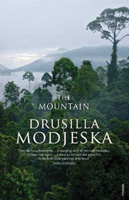 |
Drusilla Modjeska is best known for her non-fiction (Poppy, The Orchard and Stravinsky's Lunch being prime examples), but now she has decided to take a wander down the fiction road with her first novel The Mountain, She was recently interviewed by Geordie Williamson for "Readings": |
'Looking back, I think I was always a kind of novelist in hiding and I rather wish I'd learned the art of fiction after Poppy. I guess the reasons I didn't are complex - to do with having one foot in the university system, probably psychological reasons going back to childhood when I'd get into trouble for my 'stories' (my mother called them my embroidery!) and also a deep vein of interest in history which also goes right back to early days of school.'
Just as tough to resolve was the question of relations between history and invented experience, since Modjeska's academic background had in the past placed her on the other side of the divide. The challenge, she says, 'was learning to trust the characters as the foundation of the novel and let the history speak through them'. It is a measure of her success that the huge amounts of information contained in The Mountain - from the early years of independence to Highland bark-cloth design, traditional land ownership and forest exploitation - are allowed to unfold through characters' individual experience rather than editorials embedded in the text.
The question all of this information raises is more personal: to what degree has the author's life informed The Mountain? While Modjeska is at pains to explain that the novel is not autobiographical, she readily admits how deeply it has been informed by her time in Papua New Guinea (she did go into the field with her then husband, and completed a year at university in Port Moresby before moving to Australia in the early 1970s), by her return trips, and by her wide reading of history, poetry, fiction and anthropology by locals and outsiders. More recently, Modjeska's efforts to establish small-scale education and arts-based projects in two villages has renewed her ties to PNG:
'I like Hilary Mantel's phrase "informed imagination" and that's how I think of it, and what I hope I have come some way towards achieving. So yes, the "history", the background against which the lives and loves of the characters take shape is 'informed' and I hope will be recognisable to others who have lived through those extraordinary years, but it is as much an exercise in "imagination"... For instance, while Rika and Aaron are fully imagined characters, the conflicting pressures on them - political, emotional, cultural - are informed by what I have seen, and known (in others) and read.'
